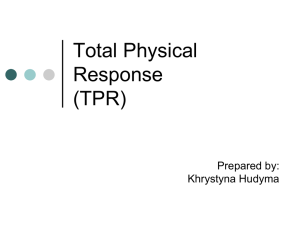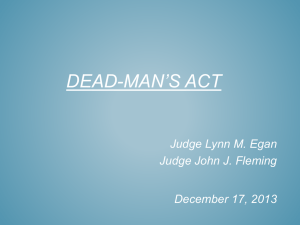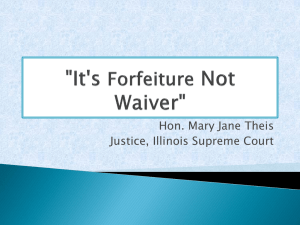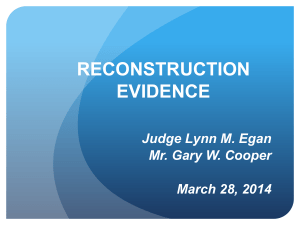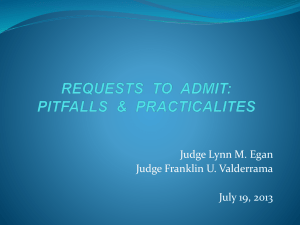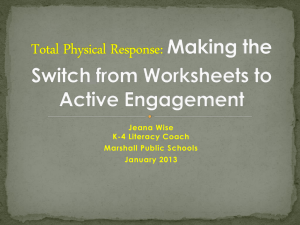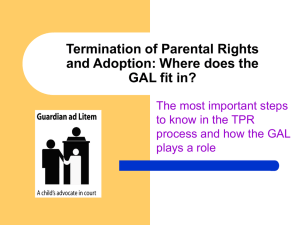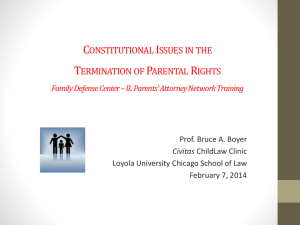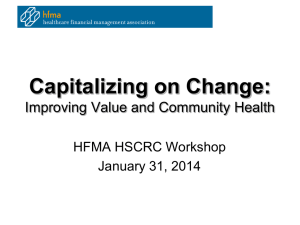Defending Against the Substantive Grounds for
advertisement
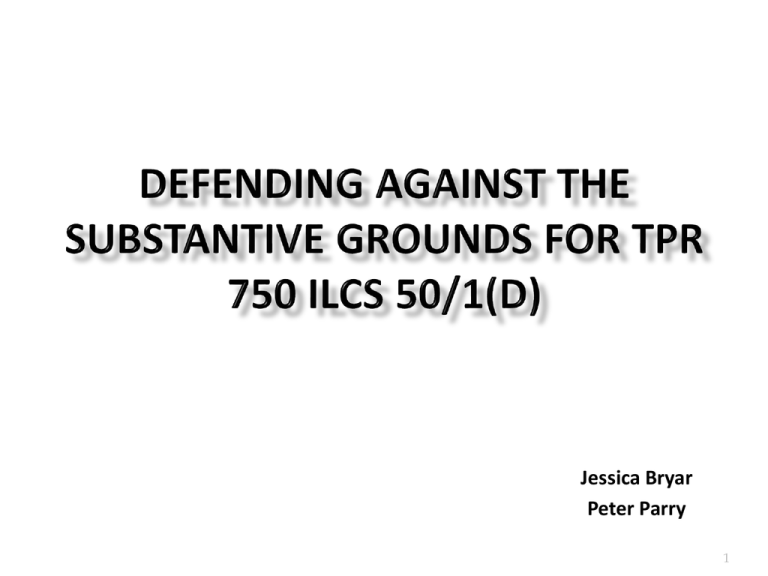
Jessica Bryar Peter Parry 1 Part I The Parent Who Failed Grounds “b” “k” “m” Part II The Broken Parent “d” “e” and “g” “f” and “i” “r” and “s” “p” “t” Questions? Any time left for Best Interests? 2 Ground “b” “Failure to maintain a reasonable degree of interest, concern or responsibility as to the child’s welfare.” • Vague terms • Measure parent’s efforts, not success • Visits, phone calls, letters 3 Transportation Poverty Actions and statements of others hindering or discouraging visitation Coping with other problems Letters, telephone calls, gifts? In re Adoption of Syck, 138 Ill.2d 255 (1990) 4 Ground “b” is not confined to visiting. . . “Noncompliance with an imposed service plan, a continued addiction to drugs, a repeated failure to obtain treatment for an addiction, and infrequent or irregular visitation with the child have all been held to be sufficient evidence warranting a finding of unfitness under subsection (b).” In re Jaron Z., 348 Ill.App.3d 239 (1st Dist. 2004) 5 Ground “k” “Habitual drunkenness or addiction to drugs, other than those prescribed by a physician, for at least one year immediately prior to the commencement of the unfitness proceeding.” 6 The Illinois Supreme Court’s test for “k”: In the one year immediately prior to the filing of the TPR petition, the parent: Had a ‘fixed habit” of drinking (or using non-prescribed drugs) to “excess.” Excess means that the parent “suffered significant impairment in her ability to supervise and parent her children due to the consumption of alcohol.” And “used alcohol so frequently as to show an inability to control the need or craving for it.” In re J.J., 201 Ill.2d 236 (2002) 7 This was enough evidence to terminate under Ground “k”: •Drank 6 to 12 beers every day for the first two months of the one year period. •Tested positive for cocaine twice during middle of the one year period. In re Precious W., 333 Ill.App.3d 893 (3rd Dist., 2002) 8 Ground “m” Failure by a parent (i) to make reasonable efforts to correct the conditions (that led to the removal of the child) during any 9month period after adjudication, OR (ii) to make reasonable progress toward the return of the child during any 9-month period after adjudication. Failure to make reasonable progress includes the parent’s failure to substantially fulfill her obligations under the service plan and correct the conditions, if those services in the service plan “were available.” 9 Ground “m(i)” is easy to prove – or easy to defend. It’s subjective. Ground “m(ii)” is objective – follow the service plans. What is “reasonable progress?” “Demonstrable movement toward the goal of reunification.” In re C.N., 196 Ill.2d 181 (2001). 10 Reasonable progress is measured against the conditions that triggered the child’s removal AND “other serious conditions” that existed at the time of the removal, but were not discovered until after temporary custody. The serious conditions are those which could give rise to a finding of abuse or neglect. Reasonable progress is measured by the parent’s compliance with service plans and the court’s directives, related to the conditions that triggered the child’s removal and the other later-discovered serious conditions. 11 The focus in evaluating a parent’s progress toward reunification remains “on the fitness of the parent in relation to the needs of the child.” 12 The Imprisoned Parent and Ground “m” Incarceration does not toll the 9-month period. In re J.L., 236 Ill.2d 329 (2010). However, were the services “available?” First 6 months in prison – Took psychotropic medication, completed 4-day anger management class, completed prestart program (academic courses), eight sessions of parenting classes. Did not take a domestic violence course. Last 3 months out of prison – Stopped taking psychotropic medication. Visits did not go well. 13 Ground “m” and the Privilege Against Self-Incrimination Ground “m” and the Privilege Against Self-Incrimination The General Rule: The court may not compel a parent to admit to a crime (e.g., abuse) that could be used against her in a subsequent criminal proceeding by threatening TPR. In re A.W., 231 Ill.2d 92 (2008); In re P.M.C., 387 Ill.App.3d 1145 (5th Dist. 2009) 14 A parent refuses to admit to the abuse in therapy. So, the parent “fails to complete” the therapy. Then, the parent’s refusal and failure are used as evidence in a Ground “m” case. Held: The parent’s refusal and failure cannot be used against the parent in the TPR trial IF the parent can show that her admission was required by the court or the therapist and show that there was no way to complete “meaningful” therapy without the admission. The court and service plan can direct the parent to engage in therapy but may not compel therapy which requires the parent to admit to a crime. 15 Grounds “d”, “e” and “g” “d” – “Substantial neglect . . . If continuous or repeated.” “e” – “Extreme or repeated cruelty to the child.” “g” – “Failure to protect the child from conditions within his environment injurious to the child’s welfare.” Can a parent, who has made reasonable efforts and reasonable progress under “m,” nevertheless be found unfit under Ground “d” (or “e” or “g”)? Yes. In re D.F., 201 Ill.2d 476 (2002) 16 Grounds “f” and “i” Ground “f” 1) 2 or more findings of physical abuse in Juvenile Court; OR 2) Convicted or NGRI resulting from death of any child by physical abuse; OR 3) finding of physical abuse-death of any child in Juvenile Court. THEN: rebuttable presumption, to be overcome only by clear and convincing evidence, that the parent is unfit. 17 Ground “i” What is “depravity?” “An inherent deficiency of moral sense and rectitude. . . . Acts constituting depravity must be of sufficient duration and of sufficient repetition to establish a deficiency in moral sense and either in inability or an unwillingness to conform to accepted morality.” In re J.A., 316 Ill.App.3d 553 (1st Dist. 2000) The “three strikes” provision: Three prior felony convictions, one of which occurred within 5 years of the filing of the TPR petition. THEN: rebuttable presumption that the parent is depraved and unfit – to be overcome by only clear and convincing evidence? 18 Grounds “r” and “s” – The Incarcerated Parent Ground “r” The parent is incarcerated at the time the TPR is filed, prior to incarceration the parent had little or no contact with the child or provided little or no support, and the parent’s incarceration will prevent the parent from discharging her “parental responsibilities for the child for a period in excess of 2 years after” the filing of the TPR. “little to no contact” = “small in number” or “lacking distinction” 19 Father unfit under “r”: Had not seen children in the three years prior to the TPR trial; had been out of prison only 10 months during the preceding 6 years; had not requested visits in prison; had not provided any support, financial or otherwise. In re S.R., 326 Ill.App.3d 356 (2nd Dist. 2001). 20 Ground “s” The parent is incarcerated at the time the TPR is filed, the parent has been “repeatedly incarcerated,” and the parent’s “repeated incarceration has prevented the parent from discharging his or her parental responsibilities for the child.” An incarceration occurring before the child is born may be used against the parent. So, State need only prove one incarceration during child’s lifetime. In re D.D., 196 Ill.2d 405 (2001). 21 What are the “parental responsibilities?” The “capacity to provide financial, physical and emotional support for the child.” In re D.D. , 196 Ill.2d 405 (2001)(father imprisoned nearly his entire adult life “acquired no appropriate life skills” and showed an “inability to conform to societal norms”). 22 Assessing impact of repeated incarceration on ability to parent does not end at filing of TPR: the court must consider the ability to parent from prison to the time the TPR trial is conducted. In re Gwynne P. , 215 Ill.2d 340 (2005). Because Gwynne’s mother never parented her, because Gwynne has special needs her mother is not trained to handle, and because the mother has no high school diploma and no job skills, she is unfit under “s.” 23 Ground “p” “Inability to discharge parental responsibilities supported by competent evidence from a psychiatrist, licensed clinical social worker, or clinical psychologist of mental impairment, mental illness or an intellectual disability . . . or developmental disability . . . and there is sufficient justification to believe that the inability to discharge parental responsibilities shall extend beyond a reasonable time period.” 24 What are “parental responsibilities” under Ground “p”? The same as in Ground “s”? Meeting the child’s physical, material, moral, mental and emotional needs. What to do when the State requests a pretrial mental health examination of the parent? 25 Ground “t” 1) Child in this TPR was born + for controlled substance. 2) One prior child was born + and adjudicated DEI. 3) After that prior child was born, mother had the “opportunity to enroll in and participate in a clinically appropriate substance abuse counseling, treatment and rehabilitation program.” Yes, the burden of proof is still “clear and convincing evidence,” yet it appears that the State may prove up the entire case with certified and delegated medical records. In re Jamarqon C. , 338 Ill.App.3d 639 (2nd Dist. 2003). 26
